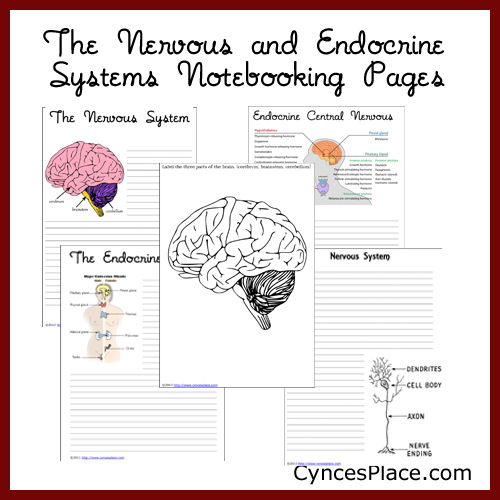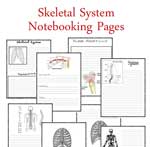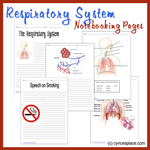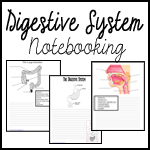Nervous System Notebooking Pages
Sometimes when creating or doing a project, I get b-o-r-e-d! That happened with the anatomy notebooking pages. But, I am back!!
Today, I have the Nervous System Notebooking Pages which includes a few on the Endocrine System as well.
Here are some questions that can be used to help fill in these pages. These notebooking pages do well as a supplement to Apologia’s Elementary Anatomy book and their General Science book.
1. Draw a figure of a nerve cell; draw and describe the dendrites. What is the neurite?
2. How many kinds of tissue are there in the nervous system?
3. What are nerve centers?
4. Draw a figure representing a section of the spinal cord.
5. Of how many main divisions is the brain composed?
6. Of what importance are the convolutions of the brain? What is the principal work of the Cerebrum? Of the Cerebellum? Of the Medulla Oblongata?
7. Why does the brain need rest?
For Older Students:
1. What are the organs of the nervous system? What is the function of each part of this system? Of the nerves? The cord? The brain? How are nerves classified according to their functions? Describe a nerve. What is a nerve ganglion?
2. Describe the spinal cord. How many nerves join the cord? What two sets of fibers does each spinal nerve carry? Where is the brain situated? Describe the brain. In which side of the brain are located the cells which regulate the action of the right side of the body?
3. Name some of the cranial nerves. What are the meninges? Is the nerve of sight motor or sensory? Is the nerve of hearing motor or sensory? Is the pneumogastric nerve motor or sensory? Classify the spinal nerves as motor or sensory.
4. What is the sympathetic nervous system? What is the function of the cerebral hemispheres? What kind of acts originate here? Can the muscles act if the nerve which connects them with the brain or cord is cut? What kind of acts take place without the use or intervention of the brain? Describe a reflex act. Name some of our actions which are done without our thinking. What occurs in the brain cells whenever we think or perform a voluntary action?
5. Can the brain and nerve system be developed? How? What is the training of the nervous system called? What are habits? What is the chief end of the study of mathematics and grammar? Why should we read good books? When does the nervous system rest?
I thought questions 5 & 6 in #5 were interesting. I got these questions from an old book and they had this to say right along with the anatomy study:
Object of study. The mind is trained by the study of mathematics, language, physics, philosophy, to develop its powers of reasoning and thinking. It is not so much the facts which the child learns as the habits of quick and accurate thinking which count. With these habits he is in a position to make the most of the knowledge and experience which he acquires later. If he has gained the habits of accurate observation and of perseverance and industry, he is well equipped for his progress through the world.
Education is by no means confined to the schools. The greater part of it is obtained in the home and in the community about us. At home the boy is given good books, that he may read of the good deeds and noble lives of the world’s history. He is taught courtesy and charity, that he may make those about him happier. He is taken to walk in the woods and fields, and instructed in the story of the rocks and plants and animals, that he may come to love nature and to find an interest in studying its works. He is taken to see great works of art and to hear good music, and taught to care for poetry, that he may acquire refined tastes and see more of the grace and beauty in life.
In this education it is not enough that children shall read books or see paintings or sculptures. They must be taught to appreciate the meaning which is in the work, to feel the spirit which inspired the writer or painter who conceived it, and to understand the thoughts and ambitions and passions which have molded the lives of the men and women who have made the history of which they read. If they learn these things, to them life becomes filled with an interest and a joy which can never die.
“He ate and drank the precious words,
His spirit grew robust,
He knew no more that he was poor
Or that his frame was dust;He danced along the dingy days—
And that bequest of wings
Was but a book. What liberty
A loosened spirit brings!”A most important habit to acquire is that of self-control. It is this quality perhaps beyond all others which distinguishes manhood. The emotions of sympathy, love, pity, enthusiasm, religion, are all excellent elements of our characters. They help to ennoble us and to lead us to strong endeavor, high thought, and worthy action. But they lose much of their usefulness if they are not controlled by judgment and a sense of justice and right, so that they are allowed to sway us only for the greater good of those about us. More especially should the passions of anger, jealousy, sensuality, and the many ignoble impulses which arise from the desire of possession be controlled. In the submission to these lies a great part of the woe and crime which darken the pages of history.
True happiness comes not through the gratification of the desires for the material things of the world about us, but from the possession of a well-balanced mind which can discern the real treasures of life, and a spirit inspired with the pursuit of truth.
Everybody has affinities for truth and culture. If they are developed the man will take his pleasure in good pursuits; if not, he will indulge in sensual pleasures. Everybody should be athletic, but he should also be clever and refined. In these days a clever head and a well-trained mind will accomplish far more than muscular strength.
Pretty neat eh?
Okay, here is the link for the Nervous System Notebooking pages.
Download Nervous and Endocrine System Notebooking Pages
Nervous System Links:
Lots of videos, powerpoints, and games
Links to other websites for lesson plans, quizzes, experiments, etc.
Neuroscience for Kids
Activities To Try:
1. Cross one knee over the other, and let the leg hang loosely. Strike the upper leg sharply with the hand just below the kneecap. The lower leg will jerk suddenly forward. This is an example of a muscular movement occurring without the intervention of any thought upon the part of the individual.
2. Tickle the nose with a feather. The sneeze which follows is a reflex act of the body to rid itself of the source of irritation to the mucous membrane of the nose.
3. Pass the hand rapidly close to the eyes of the student next you. The rapid winking of the lids is an example of an involuntary action established to protect the eye.
4. Note the deep and rapid respiration which replaces the ordinary respiration after exertion, as running. This is an automatic action in response to the need of more respiratory exchange to supply the increased combustion resulting from the increased muscular action.
I hope these bless you in some way or other,
![]()







I LOVE your site, and thank you so much for your work! I am still homeschooling 5 of my nine kids and this saves me so much time!!! God bless you!!!
It is my pleasure Elizabeth. Thank you for stopping by. I hope you kids enjoy the notebooking pages. 🙂
Hi. I’m trying to download the notebooking pages, but for some reason I can’t.
Daly, I sent you an email with the file attached. Thanks again for visiting my website. 🙂
Hi. I am trying to download your nervous system notebooking pages and I keep coming up with errors that say the files are corrupt. I also tried to download some other of your human body notebooking pages and had the same issue although some of them I was able to download. Is there anything you can do about that or can you send the file to me?
Thanks,
Lori Pruitt
Hi Lori. I apologize for the errors. I am not sure what caused them, but the database did need to be updated. I did update it, so hopefully you can now download the notebooking pages. If you still have problems, I will be happy to email them to you. 🙂
Hi! I just found your website! Thank you for sharing your work. I really enjoyed reading the section from the old book you mentioned. Might I ask the name and author of your treasure. I love old books and would like to read more, maybe I’ll be able to find another copy. Thank you, be blessed!
Sure! The title is Anatomy, Physiology and Hygiene for High Schools by Henry Fox Hewes. I found it at Google Books. http://books.google.com/books?id=hM4XAAAAIAAJ&
Thanks for stopping by! 🙂
Hi,
I sure do appreciate all the wonderful copywork and science pages you have created. Last year we started with your notebook pages for Apologia’s elementary Anatomy and Physiology book. We got through lesson 5 done and I’m looking to finish, but I can’t find it now. Could you please help direct me?
Thank you,
Christina